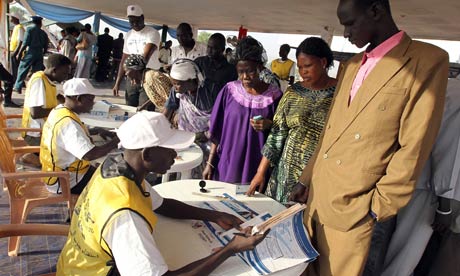By Laura Hirahara
Impunity Watch Reporter, Africa

KHARTOUM, Sudan- In a matter of days the results of Sudan’s referendum vote to decide whether South Sudan should be independent of North Sudan will be announced. With preliminary polls showing an almost unanimous vote from the South Sudanese in favor of succession it is expected that the referendum will pass. Following the relatively peaceful voting process, questions now loom as to whether the North and South will be able to transition peacefully and negotiate bilateral resource sharing agreements until South Sudan is truly independent.
Even before Sudan gained independence from British colonial powers and Egyptian rule it was embroiled in civil war. Fighting between the North and South regions persisted for decades, lasting from 1955-1972 and again from 1983-2005. Finally, in 2005 a Comprehensive Peace Agreement (CPA) was brokered between the North and South which created an interim government with an option to extend the CPA in six years or vote for succession. Within a few years of the CPA, it became clear to leaders in both the North and South that neither would be willing to agree to the CPA long-term, prompting the vote.
Since the vote and the expectation that South Sudan will become an independent nation, concerns are growing over issues of citizenship, boundary demarcations, oil resources and how South Sudan will function as a government. One of the more immediate problems facing the split between the two regions is that fact that tens of thousands of South Sudanese are currently living and working in the North. Many occupy civil servant positions, working in several capacities including law enforcement. Some expect the North Sudan government in Khartoum, led by Omar al-Bashir, to simply revoke the Sudanese citizenship of all South Sudanese living in the North which could create conflict as thousands of people are displaced. The CPA, which would provide a roadmap in the coming years for agreements between the two countries, has no provisions for such citizenship issues.
Causing unrest for the international community is how both regions will handle their oil concerns and interact with one another in splitting natural resources . Since the U.S. sanctioned Bashir’s government in the North, Asian countries have been the primary investors and buyers of Sudanese oil. U.S. President Barack Obama has pledged to lift the sanction aimed primarily at the North if Bashir follows the steps outlined in the CPA. This could open the region to Western investment and oil exportation, something it has not seen in years.
Additionally, the business of transporting and refining oil between the North and South has become increasingly complex. Approximately sixty percent of the oil wells are in South Sudan but all the pipes run into the North and the South currently depends on the North to refine and sell its oil. Adding to this, there is also no consensus on whether the oil rich state of Abyei, which straddles the contested border between the two regions, will become part of North or South Sudan. In order to gain oil independence, South Sudan has plans to build a pipeline to Kenya which would allow it to export its oil independent of the North but a plan like that will take years to complete. With oil being the primary source of revenue for Sudan, it is doubtful that the North will be willing to give up its interest in Southern oil. Both countries will need to focus on peaceful negotiations that allow for resource sharing.
Focusing solely on South Sudan, many wonder if a new government in the region will be able to meet the needs of a country. Until now, the South Sudan People’s Liberation Movement (SPLM) has operated as a resistence movement seeking to protect and promote minority rights. The ethnic and religious diversity of South Sudan’s population has made it the target of the North, which routinely excluded minority concerns. While a vote to split from the North would end this, some fear that infighting and the inability to act as a government will plague the South. The South will need to focus on infrastructure, social services and providing proper diplomacy and foreign policy to guide its new government.
While the split seems like the next natural step for Sudan it also shows the implications of a history of human rights abuses and civil war. Co-founder of Global Brief and the Head of the Counsel Assistance Unit of the ICC Sam Sasan Shoamanesh, writing for The Huffington Post, stated
Anyway you ‘cut’ it, the Sudanese story is a continuing tragedy, and a ‘yes’ vote is yet another example of the scars created by the nation’s war torn and tortured modern history. What is incontestable is that the people of Sudan of all ethnic and religious stripes deserve a more dignified existence, nestled in the security and promise of peace and prosperity. If at this stage, secession is the only means of realizing these necessities, then it is perhaps a mal nécessaire, which history will have to accept.
For more information, please see;
The Huffington Post– Sudan; A Tragedy Any Way You ‘Cut’ It– 4 Feb., 2011
The Namibian– Sudan: Post-Referendum Issues and Implications for Africa– 25 Jan., 2011
Business Monitor International– South Sudan Referendum: Oil Industry Implications– 19 Jan., 2011